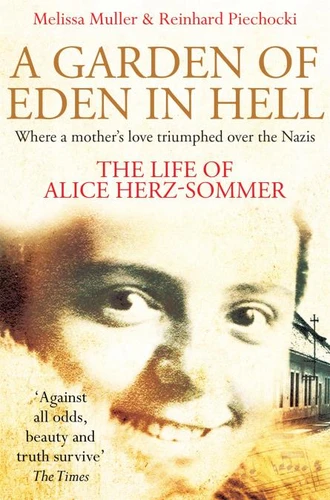A Garden of Eden in Hell: The Life of Alice Herz - Sommer
Par : ,Formats :
Disponible dans votre compte client Decitre ou Furet du Nord dès validation de votre commande. Le format ePub protégé est :
- Compatible avec une lecture sur My Vivlio (smartphone, tablette, ordinateur)
- Compatible avec une lecture sur liseuses Vivlio
- Pour les liseuses autres que Vivlio, vous devez utiliser le logiciel Adobe Digital Edition. Non compatible avec la lecture sur les liseuses Kindle, Remarkable et Sony
- Non compatible avec un achat hors France métropolitaine
 , qui est-ce ?
, qui est-ce ?Notre partenaire de plateforme de lecture numérique où vous retrouverez l'ensemble de vos ebooks gratuitement
Pour en savoir plus sur nos ebooks, consultez notre aide en ligne ici
- Nombre de pages368
- FormatePub
- ISBN978-0-330-53939-5
- EAN9780330539395
- Date de parution17/12/2010
- Protection num.Adobe DRM
- Infos supplémentairesepub
- ÉditeurPicador
Résumé
Alice Herz-Sommer was born in 1903 in Prague, the Prague of the Hapsburgs and of Franz Kafka, a family friend. Musically very gifted, by her mid-teens Alice was one of the best-known pianists in Prague. But as the Nazis swept across Europe her comfortable, bourgeois world began to crumble around her, as anti-Jewish feeling not only intensified but was legitimised. In 1942, Alice's mother was deported.
Desperately unhappy, she resolved to learn Chopin's 24 Etudes - the most technically demanding piano pieces she knew - and the complex but beautiful music saved her sanity. A year later, she, too - together with her husband and their six-year-old son - was deported to a concentration camp. But even in Theresienstadt, music was her salvation and in the course of more than a hundred concerts she gave her fellow-prisoners hope in a world of pain and death.
This is her remarkable story, but it is also the story of a mother's struggle to create a happy childhood for her beloved only son in the midst of atrocity and barbarism. Of 15, 000 children sent to the camp, Raphael was one of the 130 who survived. Today, Alice Herz-Sommer lives in London and she still plays the piano every day.
Desperately unhappy, she resolved to learn Chopin's 24 Etudes - the most technically demanding piano pieces she knew - and the complex but beautiful music saved her sanity. A year later, she, too - together with her husband and their six-year-old son - was deported to a concentration camp. But even in Theresienstadt, music was her salvation and in the course of more than a hundred concerts she gave her fellow-prisoners hope in a world of pain and death.
This is her remarkable story, but it is also the story of a mother's struggle to create a happy childhood for her beloved only son in the midst of atrocity and barbarism. Of 15, 000 children sent to the camp, Raphael was one of the 130 who survived. Today, Alice Herz-Sommer lives in London and she still plays the piano every day.
Alice Herz-Sommer was born in 1903 in Prague, the Prague of the Hapsburgs and of Franz Kafka, a family friend. Musically very gifted, by her mid-teens Alice was one of the best-known pianists in Prague. But as the Nazis swept across Europe her comfortable, bourgeois world began to crumble around her, as anti-Jewish feeling not only intensified but was legitimised. In 1942, Alice's mother was deported.
Desperately unhappy, she resolved to learn Chopin's 24 Etudes - the most technically demanding piano pieces she knew - and the complex but beautiful music saved her sanity. A year later, she, too - together with her husband and their six-year-old son - was deported to a concentration camp. But even in Theresienstadt, music was her salvation and in the course of more than a hundred concerts she gave her fellow-prisoners hope in a world of pain and death.
This is her remarkable story, but it is also the story of a mother's struggle to create a happy childhood for her beloved only son in the midst of atrocity and barbarism. Of 15, 000 children sent to the camp, Raphael was one of the 130 who survived. Today, Alice Herz-Sommer lives in London and she still plays the piano every day.
Desperately unhappy, she resolved to learn Chopin's 24 Etudes - the most technically demanding piano pieces she knew - and the complex but beautiful music saved her sanity. A year later, she, too - together with her husband and their six-year-old son - was deported to a concentration camp. But even in Theresienstadt, music was her salvation and in the course of more than a hundred concerts she gave her fellow-prisoners hope in a world of pain and death.
This is her remarkable story, but it is also the story of a mother's struggle to create a happy childhood for her beloved only son in the midst of atrocity and barbarism. Of 15, 000 children sent to the camp, Raphael was one of the 130 who survived. Today, Alice Herz-Sommer lives in London and she still plays the piano every day.









